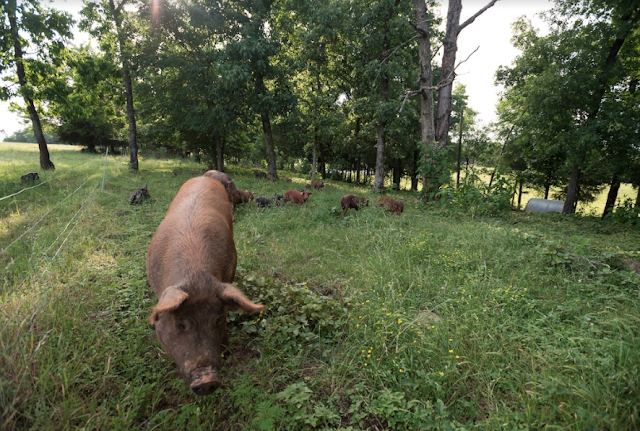 Grass Roots Co-op has a special-deal-membership drive going on now until the end of September. In addition, members get an additional 20% off a la carte items.
Grass Roots Co-op has a special-deal-membership drive going on now until the end of September. In addition, members get an additional 20% off a la carte items.Grass Roots ships everywhere in Arkansas and other states as well. Tell your good food lovin' people in Alabama, Florida, Georgia, Illinois, Indiana, Iowa, Kansas, Kentucky, Louisiana, Michigan, Missouri, Mississippi, Ohio, Oklahoma, North & South Carolina, Tennessee, Texas and Wisconsin.
Let me tell you about the meat they gave me then I'll tell you more about the Co-op.
Ground Beef - Sometimes grass-finished beef can taste "gamey" or like wild game because it doesn't have enough fat to bring the flava. The ground beef was VERY good. I took this to a dinner party in the form of HBs cheese dip and everyone raved.
Deli Ham - Wow. It is good. And no nasty preservatives.
Brats - Amazing, especially the lime-mesquite flavored ones.
Ground Turkey - is on the menu this week in the form of lettuce wraps.
From this sampling, I wholeheartedly give my approval of Grass Roots Co-op.
What are the benefits of a co-op?
Farming is hard work. Non-stop, jack-of-all-trades kind of work. When farmers band together to form a co-op, they can focus more on growing healthy meat while someone else tends to administrative and marketing details.
For the consumer, when buying from a co-op, we get a stable meat source. Usually all cuts are available year 'round since there are multiple farmers to fill in the gaps in the event of a problem that would inhibit the farmer from delivering, like predators or herd illness. And the marketing and accounting are very pretty. (I've worked with a few farmers over the years who very much stink in the area of accounting and sadly, some are no longer farming.)
In the previous post, I recommended that if you were buying direct from a farmer you should ask questions about their practices. When I tell some people this advice they totally freeze. The thought of talking to a stranger at the farmers' market about a subject that is less than familiar totally wigs them out. When you buy from Grass Roots, they have done your homework! They have vetted the farmers for you. Before the formation of Grass Roots, I purchased from at least two of the farmers. Read here about the husbandry standards of the farmers in the co-op. Most notably, I'm quite impressed that Grass Roots prohibits GMOs.
The downside of working with a co-op is that you don't always know which farm(er) your meat is coming from. However, as stated above, the co-op makes sure the farmers are practicing with high standards so the consumer can can feel good about every piece of meat.
One thing I love about Grass Roots is how easy it is to get meat from them. They ship their products directly to your door. Shipping is free when you become a member or when you purchase at least $75. It arrives frozen in a cooler on dry ice, delivered by FedEx, and you don't have to stop what you're doing - or remember - to drive across town to meet someone for your meat. Because it is frozen you don't have to eat it right away.
What does membership include?
The Whole Farm Membership Monthly Box includes: a whole pasture-raised chicken, 2lbs grass-fed ground beef, a package of brats, & 2 lbs of forest-raised mild ground sausage.
The Chicken and Pork Box includes: a whole pasture-raised chicken, 2 lbs of forest-raised ground sausage & 2 linked sausages.
The Chicken and Beef Box includes: a whole pasture-raised chicken, 4lbs grass-fed ground beef
The Chicken Box includes: a whole pasture-raised chicken, a package of breasts (2pieces), a package of 4-6 drumsticks, a package of 5-6 wings and a package of 4-5 thighs.
If the box isn't enough for your family for the month, or if you have a special event, you can always add pieces a la cart with 20% off the retail prices.
Mouth watering yet?
Go here and sign up.
Julie
Related: The Healthiest Meat
Why is the Farmers' Market More Expensive?
Why Pay More for Grass-Fed Meat?








